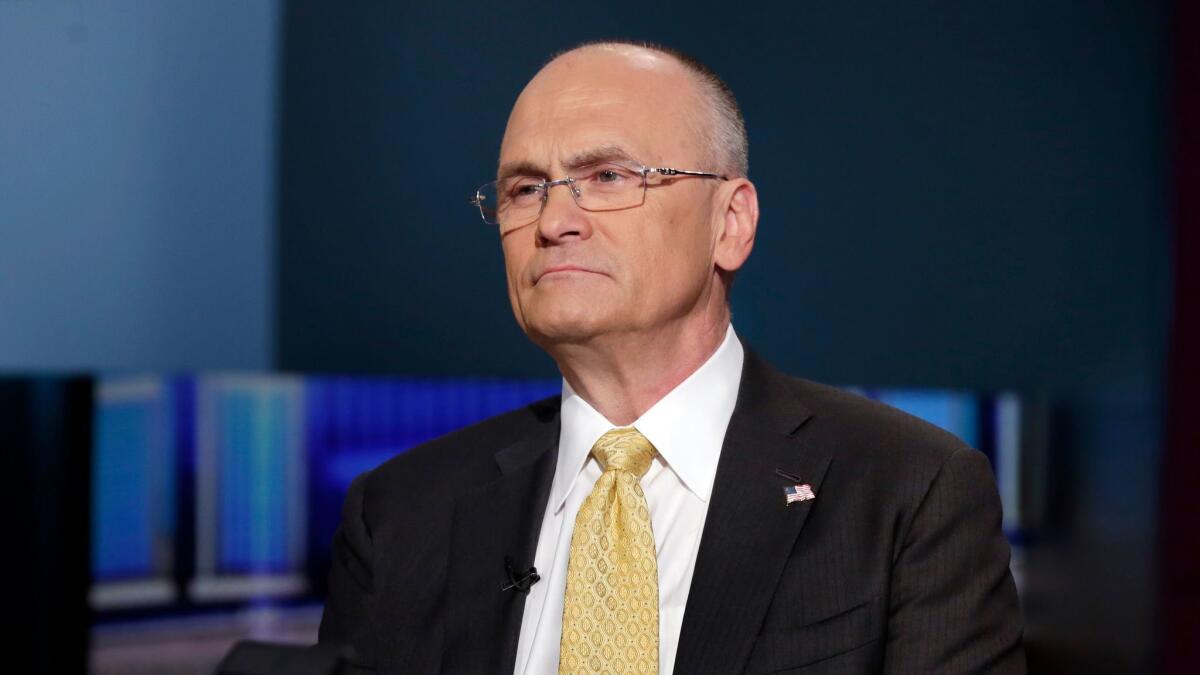Andy Puzder is stepping down as CEO of Carl’s Jr. parent firm CKE

Fast-food executive Andy Puzder, whose bid to become Labor secretary collapsed last month, is stepping down as chief executive of Carl’s Jr. parent CKE Restaurants.
Taking over the reins at CKE will be Jason Marker, a fast-food veteran who has served as president of Kentucky Fried Chicken. Marker will start the job in April.
For the record:
4:23 p.m. Nov. 15, 2024An earlier version of this article said that Puzder mused about the benefits of increased automation at restaurants in an interview with Fortune Magazine. The interview was with the Business Insider website.
For six decades, CKE — which also owns the Hardee’s chain — was based in Southern California. But last year, the company announced it was consolidating operations and moving its headquarters to Nashville, Tenn.
Puzder has served as chief executive of CKE since 2000. In a statement Tuesday, he lauded Marker as an “outstanding executive who will continue to build the Hardee’s and Carl’s Jr. brands.”
“I expressed my desire to have CKE plan for succession approximately a year ago,” he said. “I could not be more pleased to have Jason Marker selected to be the company’s next leader.”
Analysts say that Puzder’s move was unsurprising, especially after controversial details of his personal life were widely publicized during his confirmation process. Those included his hiring of a housekeeper who was in the U.S. illegally and decades-old allegations of spousal abuse.
CKE is “concerned about their perception,” said Jeff McNeal, president of restaurant and hospitality consulting firm Fessel International. “I don’t think this is anything about the financial performance of the company. It was his failed nomination.”
Puzder had been outspoken in recent years on business issues and served as an economic advisor to Donald Trump’s presidential campaign. In December, Trump tapped him to be Labor Secretary.
Democrats, unions and workers’ rights advocates immediately opposed Puzder’s nomination.
They criticized him for labor law violations at his company’s restaurants, his past opposition to an increase in the federal minimum wage, and his criticism of the Affordable Care Act. His provocative musings about the advantage of increased automation at restaurants also sparked controversy.
In an interview last year with the Business Insider website, he noted that machines are “always polite, they always upsell, they never take a vacation, they never show up late, there’s never a slip-and-fall, or an age, sex, or race discrimination case.”
Puzder’s wife recanted the old spousal abuse accusations and he paid back taxes related to his housekeeper.
But that wasn’t enough to stem the growing concern among Senate Republicans. Puzder withdrew Feb. 15. He said a top administration official called him to say there didn’t seem to be enough votes for confirmation.
“I didn’t want to tilt at windmills,” Puzder told Fox Business Network on March 9.
He blamed Democrats for the collapse of his nomination.
“I think the big problem here was the left and the Democrats really didn’t want a successful businessman who started out as a working-class kid,” he said in the Fox interview. “That really was their worst nightmare for the Department of Labor.”
Puzder got his start with CKE as the personal attorney to Carl’s Jr. founder Carl Karcher. He helped turn the company around financially in the 1990s after its purchase of the troubled Hardee’s franchise.
In 2010, CKE was taken private when it was sold in a $1-billion deal to an affiliate of private equity firm Apollo Management. Three years later, a different private equity firm, Roark Capital Group, bought the company from Apollo for an undisclosed amount.
Both Carl’s Jr. and Hardee’s operate a franchise model with about 94% of its combined locations owned by franchisees. The two chains have over 3,800 locations in 44 states and 41 countries and territories outside the U.S.
CKE has actually weathered changing consumer tastes better than rivals, McNeal said. Chains such as McDonald’s have struggled with falling sales as its diners turn to fast-casual restaurants such as Shake Shack and Blaze Pizza selling food made with higher-quality ingredients.
“They have done fairly well,” McNeal said, considering that the fast-food industry has “struggled slightly.”
CKE has successfully focused on appealing to young men by rolling out new products and running ads that feature women in bikinis chowing down on burgers (think Paris Hilton). Kentucky Fried Chicken, led by Marker, has attracted a similar demographic with over-the-top foods such as bacon sandwiched between two fried chicken fillets.
UPDATES:
5:55 p.m.: This article was updated with additional background and comments from an analyst.
This article was originally published at 3:05 p.m.
More to Read
Inside the business of entertainment
The Wide Shot brings you news, analysis and insights on everything from streaming wars to production — and what it all means for the future.
You may occasionally receive promotional content from the Los Angeles Times.











